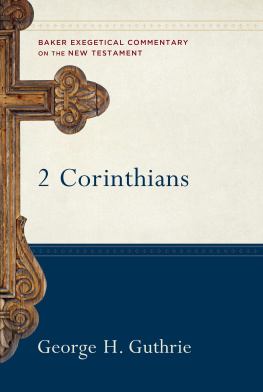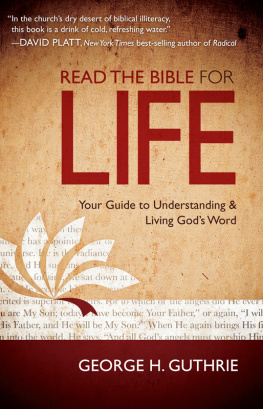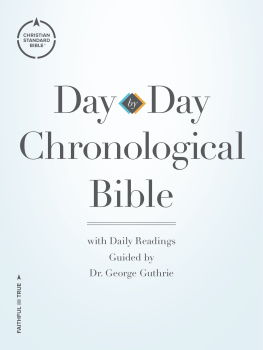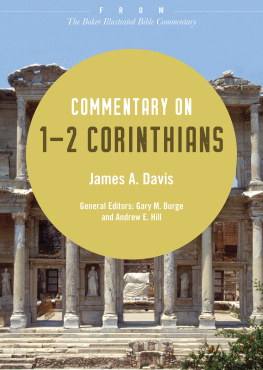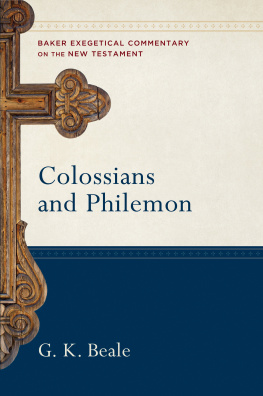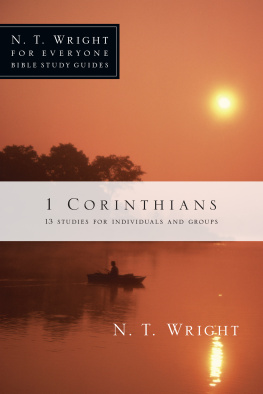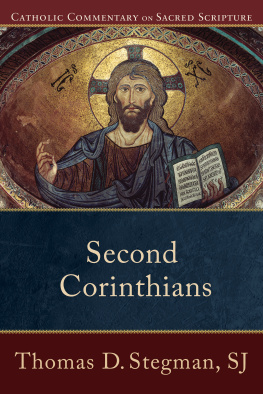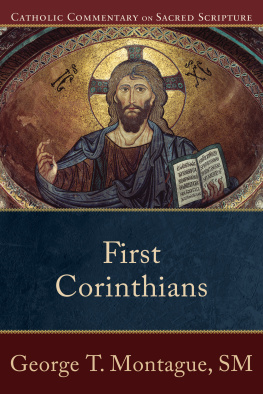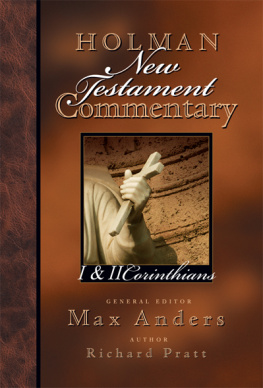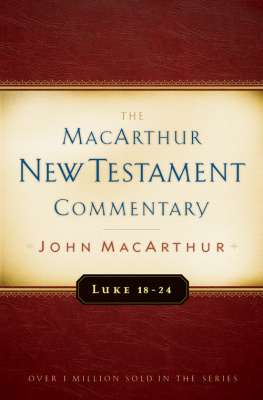George H. Guthrie - 2 Corinthians
Here you can read online George H. Guthrie - 2 Corinthians full text of the book (entire story) in english for free. Download pdf and epub, get meaning, cover and reviews about this ebook. year: 2015, publisher: Baker Publishing Group, genre: Religion. Description of the work, (preface) as well as reviews are available. Best literature library LitArk.com created for fans of good reading and offers a wide selection of genres:
Romance novel
Science fiction
Adventure
Detective
Science
History
Home and family
Prose
Art
Politics
Computer
Non-fiction
Religion
Business
Children
Humor
Choose a favorite category and find really read worthwhile books. Enjoy immersion in the world of imagination, feel the emotions of the characters or learn something new for yourself, make an fascinating discovery.
- Book:2 Corinthians
- Author:
- Publisher:Baker Publishing Group
- Genre:
- Year:2015
- Rating:5 / 5
- Favourites:Add to favourites
- Your mark:
- 100
- 1
- 2
- 3
- 4
- 5
2 Corinthians: summary, description and annotation
We offer to read an annotation, description, summary or preface (depends on what the author of the book "2 Corinthians" wrote himself). If you haven't found the necessary information about the book — write in the comments, we will try to find it.
2 Corinthians — read online for free the complete book (whole text) full work
Below is the text of the book, divided by pages. System saving the place of the last page read, allows you to conveniently read the book "2 Corinthians" online for free, without having to search again every time where you left off. Put a bookmark, and you can go to the page where you finished reading at any time.
Font size:
Interval:
Bookmark:
BAKER EXEGETICAL COMMENTARY
ON THE NEW TESTAMENT
ROBERT W. YARBROUGH
and JOSHUA W. JIPP, EDITORS
Volumes now available:
Matthew David L. Turner
Mark Robert H. Stein
Luke Darrell L. Bock
Acts Darrell L. Bock
Romans, 2nd ed. Thomas R. Schreiner
1 Corinthians David E. Garland
2 Corinthians George H. Guthrie
Galatians Douglas J. Moo
Ephesians Frank Thielman
Philippians Moiss Silva
Colossians and Philemon G. K. Beale
12 Thessalonians Jeffrey A. D. Weima
James Dan G. McCartney
1 Peter Karen H. Jobes
13 John Robert W. Yarbrough
Jude and 2 Peter Gene L. Green
Revelation Grant R. Osborne
***
George H. Guthrie (PhD, Southwestern Baptist Theological Seminary) is professor of New Testament at Regent College in Vancouver. He previously taught at Union University. Guthrie is the author of numerous books and articles, including commentaries on Hebrews and James, and was a translator or consultant on four Bible translation projects. He is currently spearheading a biblical literacy effort to help churches train their members more effectively in reading the Bible well.
2015 by George H. Guthrie
Published by Baker Academic
a division of Baker Publishing Group
P.O. Box 6287, Grand Rapids, MI 49516-6287
www.bakeracademic.com
Ebook edition created 2015
All rights reserved. No part of this publication may be reproduced, stored in a retrieval system, or transmitted in any form or by any meansfor example, electronic, photocopy, recordingwithout the prior written permission of the publisher. The only exception is brief quotations in printed reviews.
Library of Congress Cataloging-in-Publication Data is on file at the Library of Congress, Washington, DC.
ISBN 978-1-4412-2297-8
Unless otherwise indicated, all Scripture quotations are the authors translation.
Scripture quotations labeled HCSB are from the Holman Christian Standard Bible, copyright 1999, 2000, 2002, 2003 by Holman Bible Publishers. Used by permission.
Scripture quotations labeled NET are from the NET BIBLE, copyright 2003 by Biblical Studies Press, L.L.C. www.netbible.com. Used by permission. All rights reserved.
Scripture quotations labeled NETS are from A New English Translation of the Septuagint , 2007 by the International Organization for Septuagint and Cognate Studies, Inc. Used by permission of Oxford University Press. All rights reserved.
To Chuck Maxwell
and the Pastoral Leadership Team
of Northbrook Church
sincere
sent by God
living before God
in Christ
(2 Cor. 2:17b)
Contents
Series Preface
The chief concern of the Baker Exegetical Commentary on the New Testament (BECNT) is to provide, within the framework of informed evangelical thought, commentaries that blend scholarly depth with readability, exegetical detail with sensitivity to the whole, and attention to critical problems with theological awareness. We hope thereby to attract the interest of a fairly wide audience, from the scholar who is looking for a thoughtful and independent examination of the text to the motivated lay Christian who craves a solid but accessible exposition.
Nevertheless, a major purpose is to address the needs of pastors and others involved in the preaching and exposition of the Scriptures as the uniquely inspired Word of God. This consideration affects directly the parameters of the series. For example, serious biblical expositors cannot afford to depend on a superficial treatment that avoids the difficult questions, but neither are they interested in encyclopedic commentaries that seek to cover every conceivable issue that may arise. Our aim, therefore, is to focus on those problems that have a direct bearing on the meaning of the text (although selected technical details are treated in the additional notes).
Similarly, a special effort is made to avoid treating exegetical questions for their own sake, that is, in relative isolation from the thrust of the argument as a whole. This effort may involve (at the discretion of the individual contributors) abandoning the verse-by-verse approach in favor of an exposition that focuses on the paragraph as the main unit of thought. In all cases, however, the commentaries will stress the development of the argument and explicitly relate each passage to what precedes and follows it so as to identify its function in context as clearly as possible.
We believe, moreover, that a responsible exegetical commentary must take fully into account the latest scholarly research, regardless of its source. The attempt to do this in the context of a conservative theological tradition presents certain challenges, and in the past the results have not always been commendable. In some cases, evangelicals appear to make use of critical scholarship not for the purpose of genuine interaction but only to dismiss it. In other cases, the interaction glides over into assimilation, theological distinctives are ignored or suppressed, and the end product cannot be differentiated from works that arise from a fundamentally different starting point.
The contributors to this series attempt to avoid these pitfalls. On the one hand, they do not consider traditional opinions to be sacrosanct, and they are certainly committed to doing justice to the biblical text whether or not it supports such opinions. On the other hand, they will not quickly abandon a long-standing view, if there is persuasive evidence in its favor, for the sake of fashionable theories. What is more important, the contributors share a belief in the trustworthiness and essential unity of Scripture. They also consider that the historic formulations of Christian doctrine, such as the ecumenical creeds and many of the documents originating in the sixteenth-century Reformation, arose from a legitimate reading of Scripture, thus providing a proper framework for its further interpretation. No doubt, the use of such a starting point sometimes results in the imposition of a foreign construct on the text, but we deny that it must necessarily do so or that the writers who claim to approach the text without prejudices are invulnerable to the same danger.
Accordingly, we do not consider theological assumptionsfrom which, in any case, no commentator is freeto be obstacles to biblical interpretation. On the contrary, an exegete who hopes to understand the apostle Paul in a theological vacuum might just as easily try to interpret Aristotle without regard for the philosophical framework of his whole work or without having recourse to those subsequent philosophical categories that make possible a meaningful contextualization of his thought. It must be emphasized, however, that the contributors to the present series come from a variety of theological traditions and that they do not all have identical views with regard to the proper implementation of these general principles. In the end, all that really matters is whether the series succeeds in representing the original text accurately, clearly, and meaningfully to the contemporary reader.
Shading has been used to assist the reader in locating salient sections of the treatment of each passage: introductory comments and concluding summaries. Textual variants in the Greek text are signaled in the authors translation by means of half-brackets around the relevant word or phrase (e.g., Gerasenes), thereby alerting the reader to turn to the additional notes at the end of each exegetical unit for a discussion of the textual problem. The documentation uses the author-date method, in which the basic reference consists of authors surname + year + page number(s): Fitzmyer 1992: 58. The only exceptions to this system are well-known reference works (e.g., BDAG, LSJ, TDNT ). Full publication data and a complete set of indexes can be found at the end of the volume.
Font size:
Interval:
Bookmark:
Similar books «2 Corinthians»
Look at similar books to 2 Corinthians. We have selected literature similar in name and meaning in the hope of providing readers with more options to find new, interesting, not yet read works.
Discussion, reviews of the book 2 Corinthians and just readers' own opinions. Leave your comments, write what you think about the work, its meaning or the main characters. Specify what exactly you liked and what you didn't like, and why you think so.

